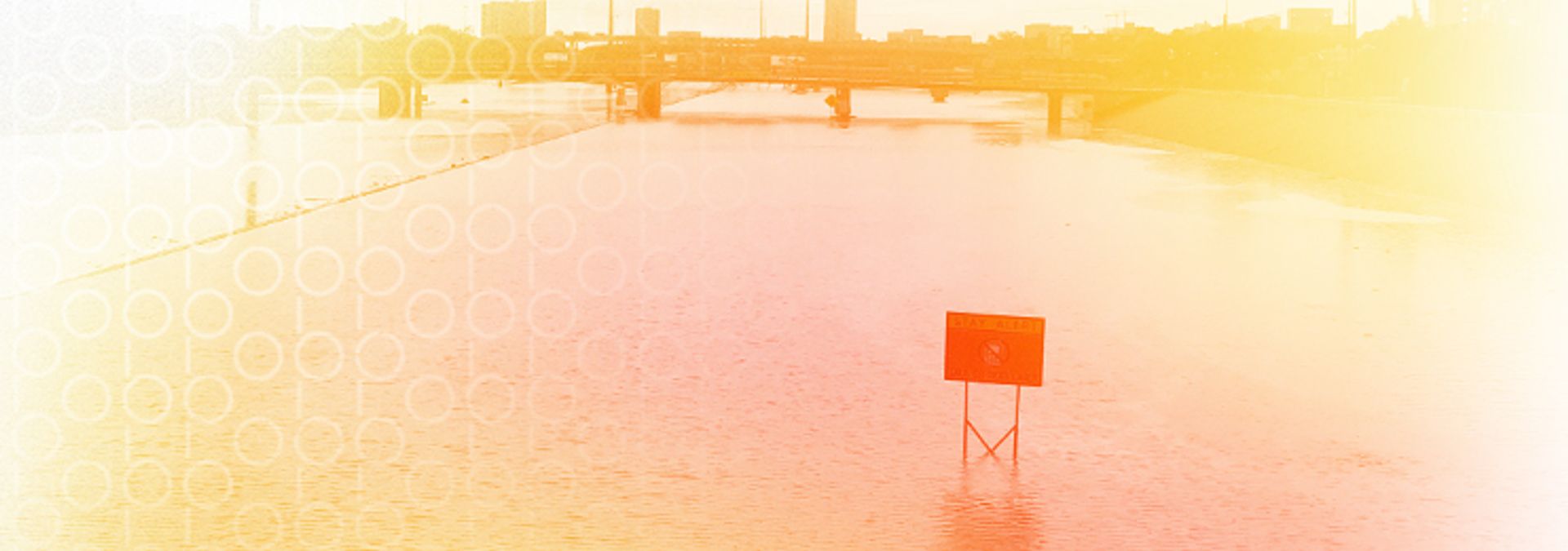
'Ignoring warning signs': A conversation about climate action with Emily Atkin
Houston lies at the epicenter of risks from climate change, heavy industry, environmental injustice and urban sprawl. Photo: Allyn West.
A former journalist for the New Republic, Emily Atkin now writes an independent newsletter for people, she says, who are “pissed off about the climate crisis.”
It’s called Heated.
The implications are urgent for Houston at the start of hurricane season. Not only did climate denialism emerge here from the boardrooms of fossil fuel companies, our industrial, sprawling region lies at the epicenter of risk from storms being accelerated, Atkin says, by “the basic physics of a hotter atmosphere.”
That’s why she does what she does. “The only thing that I'm really confident about is that information is power,” she says. “The best way to fight a campaign of decades of disinformation is to make the truth louder than that.”
This conversation has been edited and condensed for clarity.
Catherine Fraser: Houston has all this industry that's constantly pumping out pollution that's contributing to climate change. We know that is making disasters worse, and then even more pollution is being emitted during these dramatic events. There's this feedback loop. How can we get out of it?
Emily Atkin: Houston does have that triple-whammy of being right in the path of potential hurricanes, with particularly bad urban sprawl, so a particularly high risk for bad flooding. And then this is where a large part of our oil and chemical refining happens. The industrial area is right where all the storms hit, so there are all these implications. How do these plants prepare when a storm happens?
What happens, normally, is they shut down, and when they do, they release massive amounts of emissions, many of which are toxic to human health. But then Houston lacks zoning laws, so people live right next to these plants. I guess it really is a quadruple-whammy of public health threats.
CF: Houston sits at the intersection of so many of these issues. Individual action isn’t going to solve them. You talk about the need for systems change.
EA: Eating less meat is fine, it’s a good thing to do, but it’s not going to prevent a Latino neighborhood from getting sick from fumes that get emitted right before a hurricane hits. I remember covering Harvey, before the storm, calling some activists I knew in Manchester, the Latino and black neighborhood right by the industrial area [near the Ship Channel]. I asked, “How’s everything going?”
And this activist was like, "It smells so bad today."
I was like, “Normal bad?” Because I had gone there, and he'd taken me around, and it does smell bad on a normal day. He was like, “It's giving me a headache when I go outside, and I'm used to this.”
It was, again, because so many of the plants were shutting down for the storm. So, your habit of eating less meat is good, but unless you're trying to change zoning laws or trying to ensure that there's a better preparation process for plants when storms happen, it doesn't do much for the people who are suffering right now.
People focus on climate change on a national basis, and I’m guilty of that, too, because that’s my area. But there are so many things that could be done on a local level that would improve people's lives now.
CF: In your latest podcast series, you talk about how climate change and COVID are inseparable. We’re seeing that in Houston, where environmental justice communities around these facilities are the most affected, with infection rates and death rates that are significantly higher than in other parts of the region. How are environmental justice communities impacted by the intersection of these things, disasters, climate and COVID?
EA: I've been thinking about it a lot, obviously, because of the situation in Minneapolis and George Floyd's death. So many climate activists of color who spend their careers working on behalf of their communities are exhausted, emotionally, by the general injustice of racism. These are activists who are already dealing with issues that struggle to gain traction in mainstream environmental spaces.
At the same time, their communities are the ones disproportionately dying from COVID. They're disproportionately affected by police brutality and disproportionately affected by climate change and environmental problems. If those are the things that you're dealing with as a community, being killed by a pandemic in the next week, being killed by a cop tomorrow or being killed by climate change in a couple months or a couple years down the line, which one are you going to take off the table or deprioritize?
The people most affected by environmental injustices are busy dealing with other things that are much more apparent and immediate and seemingly urgent threats to their lives.
All of this makes me think about the importance of prioritizing environmental justice for white people, people who don't live in these communities, people like me who are just sitting in their apartment watching TV, being like, "Oh, that never happens to me. Last time, I was pulled over, it was fine." There's so much less that people like you and I have to worry about.
But this situation is making it clear to me that, unless the climate movement can show solidarity with the people most affected by climate change in these moments, then those people will be less willing to engage with climate activists. If you're like, 'Oh, climate change is my thing, racism isn't my thing,' then you can never expect people to get on board with you.
I said this in my newsletter. There's a reason why people of color are historically more likely to care about the environment than white people but far less likely to be part of an environmental group, identify as an environmentalist or take part in outdoor activities. It's because they don't feel welcome in these spaces, even though they're the ones who care about it the most. That's not a coincidence.
CF: It speaks to the need for systemic change. Because when you start talking about one issue, it’s easy to connect it to others, connecting issues of racial injustice to environmental injustice.
EA: I've been thinking a lot about my conversation with Drew Lanham, who wrote “Birding While Black.” In the newsletter, he said the climate change movement thinks the solution to engaging people is to focus more on grassroots efforts. But, he's like, The soil we're trying to grow our roots in is racist.
Unless we can fix the underlying issues of systemic racial inequality, we’re not going to be able to create a climate movement or solve climate change for all people. We’re going to create a solution that just perpetuates the same inequalities we see now.
That's not what anybody wants. I talk a lot about how it's not really about saving the planet, because the planet is going to be fine. It's about saving a habitat for humans, and that means all humans.
CF: You’ve talked about how going back to “normal,” after COVID, is a death trap.
EA: Think about what “normal” was. The hurricane season that's coming now where we're going to see potentially 20 named storms? That was going to happen, either way, without COVID. The normal we were in created a situation with intense hurricane seasons, wildfire seasons, drought seasons, increasingly intense almost every single year, especially over the long term. Going back to normal means going back to a place where we were still on the brink of crisis. Why would you want to go back to normal?
I don't have a vision for what a better society would look like, other than one that takes the recommendations of scientists seriously, prioritizes those recommendations and doesn't wait.
A huge theme of all the crises that we lived through is ignoring warning signs. We ignored warnings from scientists over and over that we needed to put social distancing measures in place. With climate change, we're ignoring what scientists are saying. I don't know how to create that society, and it's not really my job to tell people how to create that society. I think that's the work of activists and policymakers. But it is my job as a journalist to tell you that that's the reason we see all these problems, right? Or it is one reason, a theme we've identified. I'm sure there are lots of smart people working to form local, statewide and national models of governing that prioritize the many wonderful things that science can do, the best way of finding truth that we have.
CF: Especially in a place like Houston, where we get slammed by massive flooding pretty much every year, there's really very little done to prevent these disasters that are, in some respects, warning signs. But we've had some recent hope with a Climate Action Plan committing to carbon neutrality by 2050 and committing to 100 percent renewable energy, even though there is some tension at the state level with a lack of action. But in a city rooted in oil and gas, to try to navigate a way forward, there is some hope.
EA: Plans and promises are always great! But I would say, especially in the oil and gas capital, they should be taken skeptically. When city and government officials make a promise, it's the work of everybody to make sure that promise is rooted in fact and make sure it’s going to be lived up to.
A promise is great, but there's a long history in politics of not living up to promises and not wanting to look hard truths in the face and admit the gravity of the problem.
One of the things that I try to focus on is fact-checking promises that companies and governments make about climate change. Because it is very popular to say you want to solve climate change, and it is very rare to have a plan that does something meaningful and aggressive. Good on Houston for taking a step forward, and it means that there's more accountability work to be done. You don't take anyone on their word on this, because there's too much history of people not living up to it.
Fraser is a clean air associate with Environment Texas.
STAY UP TO DATE
The quality of our newsletter is considered satisfactory and poses little or no risk.
SUBSCRIBE

